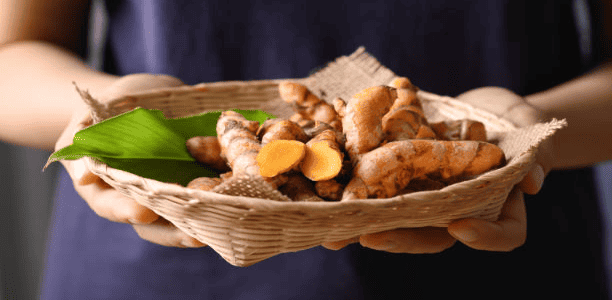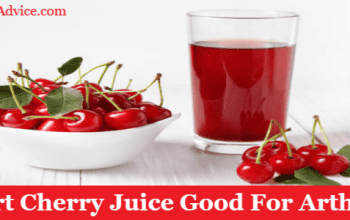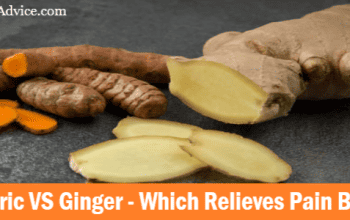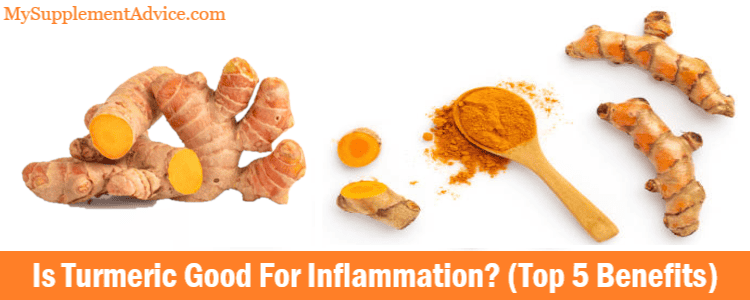
Is Turmeric good for inflammation?
Does it help alleviating swelling and other related symptoms?
Also, is it the #1 anti-inflammatory herb you should use?
Well – the answer is definitely YES.
So if you want to know more about turmeric's top 5 benefits, don't skip the following lines.
Note: This article includes references and studies on turmeric and its effects on inflammation.
Turmeric For Inflammation (In A Nutshell)
In this article, we're going to look at the potential benefits of turmeric.
To be specific, let's talk about how it can help with inflammation, because it's probably the best herb at this.
Now – turmeric has a bioactive compound called curcumin.
According to some studies, it has the following benefits:
- regulates the immune system response
- prevents inflammatory mediators release
- reduces the levels of inflammatory enzymes, cytokines and more
- decreases the possible damages caused by inflammation
The result of these benefits is inflammation management.
In other words, that's the best thing turmeric can do for you.
With that, here are the health conditions turmeric works best for:
- joint pain and swelling
- digestive problems
- inflammatory acne
- allergic inflammation
- insulin resistance
Overall – due to its anti-inflammatory properties, it's a very popular herb.
That's why it's present in different products like supplements designed against inflammation.
All in all, turmeric is probably the best herb out there if you're dealing with chronic swelling.
What Is Turmeric?
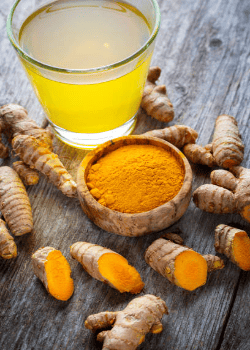
- its scientific name is Curcuma longa
- comes from the family of ginger plants
- is native to Southeast Asia (especially in India)
- has been used as a traditional medicine for different health conditions
Now – turmeric's most important component is curcumin.
It's a bioactive compound that has anti-inflammatory properties [2].
Also, it has been studied to modulate the response of the immune system.
In this way, it prevents it from attacking and destroying healthy cells.
Additionally – it works by reducing the levels of inflammation-causing enzymes and cytokines [3].
Some examples are cyclooxygenase-2 (COX-2), lipoxygenase (LOX) and inducible nitric oxide synthase (iNOS).
Lastly – curcumin inhibits inflammation that promotes tumours or cancer.
That's why turmeric is such a popular herb for pain, arthritis and inflammation.
But in this article, we're going to focus on the top 5 benefits of turmeric related to inflammation.
#1 – Manages Joint Pain & Swelling
To start off – let's describe joint pain and swelling:
- joint pain is characterized by a burning sensation or stabbing pain in your joints [4]
- in some cases, the pain can spread out to the adjacent areas of the body
- swelling is caused by the accumulation of fluid in the joint [5]
- this can cause movement restrictions in the areas
There are different triggers behind swelling and joint pain.
But the most common cause is Rheumatoid Arthritis (RA).
To give you an idea, it's an autoimmune and inflammatory disease [6].
It appears when your immune mistakenly system attacks the healthy cells in your body [7].
Consequently, this causes inflammation that would then lead to painful swelling.
The main body parts that are often affected by arthritis are the hands, wrists and knees.
Again – turmeric contains an anti-inflammatory compound called curcumin.
It can regulate the response of the immune system to avoid it from dysfunctioning.
However – it won't really cure RA, it can only manage the symptoms and offer relief.
So if you've been experiencing this health condition, try incorporating turmeric into your routine.
#2 – Suppresses Digestive Inflammation
Another type of inflammation that turmeric can help with is related to the digestive system.
To be exact – it's called Inflammatory Bowel Disease (IBD).
It's a term for the two conditions namely Ulcerative colitis and Crohn's disease [8].
Any of them can appear due to chronic inflammation in the GI tract.
With that, here are the common symptoms of the two issues [9]:
- recurring diarrhea
- intense stomach pain
- bloody stools or rectal bleeding
- fatigue or weakness
- weight loss (without trying)
- constipation
- gas and bloating
- loss of appetite
Besides genetics, IBD is also caused by the incorrect response of the immune system.
It can attack your healthy cells, due to the wrong signals sent by the bacteria in your intestinal flora [10].
This can lead to gut inflammation (especially IBD).
So how does turmeric help with this problem?
Well – turmeric blocks the inflammatory enzymes and cytokines [11].
Also, it has strong antioxidant and therapeutic benefits that can suppress the symptoms of IBD.
In addition – it might offer further protection from the future damages IBD can cause.
With that, it would be helpful to consume products with turmeric if you want a fast improvement.
#3 – Fights Inflammatory Acne
Now – Acne vulgaris (AV) is a chronic inflammatory skin disorder of the pilosebaceous unit [12].
Pilosebaceous unit is a collective term for hair shaft, hair follicle and sebaceous gland [13].
In addition – AV is characterized by the following signs in the skin:
- papules
- pustules
- comedones
- nodules
Gut dysbiosis can also lead to a disturbed skin barrier and cutaneous microbiome [14].
In this case, you might have an excess of Propionibacterium acne strains.
Additionally – these strains can colonize the sebaceous follicle ducts [15].
As a result, the immune system would release inflammatory mediators (enzymes and cytokines).
However – this response can also affect healthy cells and cause further inflammation and damage.
Based on some studies, the curcumin in turmeric has many beneficial properties.
These include antimicrobial, anti-inflammatory, anti-neoplastic and antioxidant activity [16].
In this way, it can inhibit the growth of Propionibacterium acne strains [17].
Overall, turmeric is worth considering – especially if you're battling inflammatory acne.
In that way – you can get healthy skin from within.
#4 – Regulates Allergic Inflammation
Let's now move on to turmeric's effects on allergies.
Firstly – allergens can trigger allergic reactions inside your body.
In case of a prolonged exposure, you might develop an allergic inflammation [18].
With that, here are the symptoms you need to watch out for:
- conjunctivitis
- allergic rhinitis
- asthma attacks
- urticaria
- digestive problems
- anaphylaxis
When exposed to allergens, your body will produce antibodies called immunoglobulin E (IgE) [19].
These IgE will then attach to the immune cells (mast cells and basophils).
These cells will trigger the immune system to release inflammatory mediators.
As a result – you might be dealing with a general inflammation.
Obviously – the first thing you need to do is to avoid triggers or allergens.
The next step is to consider turmeric, due to its anti-inflammatory and anti-allergic properties.
It can inhibit the release of histamine and other inflammatory mediators from mast cells [20].
This can reduce your body's allergic response and symptoms.
#5 – Reduces Insulin Resistance
Lastly – turmeric can also help with inflammation related to insulin resistance.
But first, let's define what this condition is all about [21]:
- it's a state where your cells stop responding to insulin
- insulin is a hormone that utilizes the sugar in your body and turns it into energy
- this happens when the pancreas can't keep up with producing insulin
- as a result, blood sugar levels will keep on rising
Now – obesity is one of the causes of insulin resistance.
It's because obese people have higher amounts of hormones, fatty acids, glycerol and adipose tissues [22].
Also – they have an excess amount of pro-inflammatory cytokines and other inflammatory mediators.
All of them come from the adipose tissues as the major source [23].
Consequently – if you have excess body fat, you're more prone to producing inflammatory mediators.
They can disrupt insulin signaling and lead to insulin resistance.
So that's why obesity and insulin resistance are the top factors in the development of Type 2 Diabetes [24].
Now, turmeric can inhibit the activation of pro-inflammatory genes related to obesity [25].
Due to its anti-inflammatory properties, it can reduce the inflammation that leads to insulin resistance.
Overall – try to take some adequate nutrients additionally.
Final Conclusion
Overall – turmeric has excellent anti-inflammatory properties.
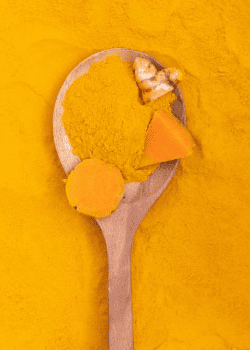
So if you're curious, here are its top benefits:
- manages joint pain and swelling
- suppresses digestive inflammation
- fights inflammatory acne
- regulates allergic inflammation
- reduces insulin resistance
To give you an idea, turmeric can reduce the levels of mediators that cause inflammation.
Also – it can modulate the immune system's response, so that it won't release more of them.
In this way, it can keep inflammatory symptoms under control.
In addition, it also decreases the consequent damage.
That's why turmeric is a popular herb when it comes to arthritis, inflammation and pain.
And that's the same reason why you can find it into so many different products.
Just remember that it's not the cure for inflammation – it's just an additional help.
References:
1 – https://www.nccih.nih.gov/health/-turmeric/
2 – https://www.ncbi.nlm.nih.gov/-pmc/articles/-PMC5664031/
3 – https://pubmed.ncbi.nlm.nih.gov/-17569207/
4 – https://www.nhs.uk/conditions/-joint-pain/
5 – https://www.sciencedirect.com/-pharmacology/-joint-swelling/
6 – https://www.nhs.uk/conditions/-rheumatoid-arthritis/
7 – https://www.cdc.gov/-arthritis/basics/-rheumatoid-arthritis/
8 – https://www.cdc.gov/ibd/what-is-IBD/-symptoms/
9 – https://www.health.harvard.edu/-coping-with-inflammatory-bowel-disease/
10 – https://www.niddk.nih.gov/-digestive-diseases/crohns-disease/-symptoms-causes/
11 – https://pubmed.ncbi.nlm.nih.gov/-19519446/
12 – https://pubmed.ncbi.nlm.nih.gov/-26741391/
13 – https://pubmed.ncbi.nlm.nih.gov/-10849897/
14 – https://pubmed.ncbi.nlm.nih.gov/-28805938/
15 – https://www.ncbi.nlm.nih.gov/-pmc/articles/-PMC3780801/
16 – https://pubmed.ncbi.nlm.nih.gov/-27213821/
17 – https://pubmed.ncbi.nlm.nih.gov/-23546001/
18 – https://pubmed.ncbi.nlm.nih.gov/-21682737/
19 – https://www.ncbi.nlm.nih.gov/-pmc/articles/-PMC3573758/
20 – https://pubmed.ncbi.nlm.nih.gov/-18398870/
21 – https://www.cdc.gov/diabetes/basics/-insulin-resistance/
22 – https://www.ncbi.nlm.nih.gov/-pmc/articles/-PMC7553667/
23 – https://www.ncbi.nlm.nih.gov/-pmc/articles/-PMC5507106/
24 – https://www.ncbi.nlm.nih.gov/-pmc/articles/-PMC3314346/
25 – https://www.ncbi.nlm.nih.gov/-pmc/articles/-PMC8004232/

